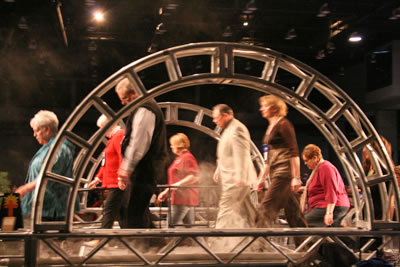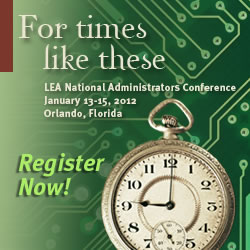Crossing Over…from Bondage to Freedom
Opening Devotional Bible Study from the 2011 Convocation
We are at our best when we guide our students across the bridge. ... The bridge is Jesus Christ. He is, as he put it Himself, the way from here to there. It seems like we Christians are forever crossing over. Sometimes we cross over and don’t even know we did it. You know, like driving somewhere, and suddenly you’re there, and you don’t even remember how you got there. Suddenly we’re married. Suddenly we’re parents. Suddenly we’re grandparents. Suddenly we’re 40. Suddenly our nest is empty. Suddenly it’s full again. These are crossings.
The biggest crossings of our Christian life are the stuff of faith stories, witness, and teaching. We need to talk about these crossings in our classrooms. We are at our best when we guide our students across the bridge. The constant in all the crossings? The bridge is the same every time. The bridge is Jesus Christ. He is, as he put it Himself, the way from here to there.
 What are the crossings we make in Christ? They are the crossings that come from being burdened, broken, and bound. Most of what we experience before we cross over can be put into these three categories -- burdens, brokenness, and bondage.
What are the crossings we make in Christ? They are the crossings that come from being burdened, broken, and bound. Most of what we experience before we cross over can be put into these three categories -- burdens, brokenness, and bondage.
First, we are burdened. The burdens we carry, the burdens our students carry, are many: anxiety or worry, grief, guilt, failure, stress, being bullied, expectations. There is a heaviness to expectations that a lot of kids experience.
I worry sometimes about the expectations parents put on their children. Oh, I know, some parents have no expectations for their kids and that’s tragic, but the hovering parent, the helicopter parent, can raise a child under a heavy load of expectations. There is no pleasing them. They have a critical spirit. Where you expect a blessing you get a curse. When you’re doing your best, they seem to find the worst possible thing to say. Their children carry untold burdens, hidden away in their psyche for years until they surface unexpectedly.
Christ offers rest to the burdened. “Come to me,” He says, “all you who are weak and heavy laden, and I will give you rest.” Matthew 11:28 Jesus Christ enters our burdens and promises us rest, relief, presence, comfort, encouragement. The Christian classroom for some of our students is the one place in their lifetime when they can rest.
Where Jesus is, there is a crossing over to wholeness, and peace and reconciliation. A second kind of crossing over is that of the broken. Our brokenness is there in conflicts, hostility, rage, fragmented relationships, shattered dreams. Not that there would be any brokenness in a Lutheran school – or strained relationships, conflicts, people broken into factions. Yet where Jesus is, there can be forgiveness, spoken in our classrooms, spoken among faculty members, in confession and absolution. Where Jesus is, there is a crossing over to wholeness, and peace and reconciliation. It happens in families, on faculties, in friendships, in marriages.
And that brings us to the third kind of crossing – the crossing from bondage. It is living with sinful habits and addictions, it’s feeling trapped and imprisoned to freedom. Burdens can become prisons. Brokenness can become a prison.
Sometimes it is the bondage of prejudice that sets up boundaries and classes. It can be a long way from here to there. We have boundaries to cross, huge gaps to span, gaps that separate us from others. Harold, a homeless man lived on a roof in a large cardboard box. When I was in the seventh grade we looked down on him from the windows of our classroom at St. Martini Lutheran School in Chicago. We were in a prison of prejudice and isolation. We spoke of love, but we did not love Harold. We didn’t even know his real name. Harold was the name we gave him. Why was it so far from here to there? Why did we never once help him? One morning, Harold didn’t come out of his box. He died. We watched from our window as they took him away. No one said a word. I cried that day for a man I did not know. We were in prison behind our windows. It is a real life parable for many of our churches and many of our schools.
Freedom, that’s what Jesus offers. Freedom has always been in our vocabulary as Christians. It is the language of the exodus, the return from exile, and the Messianic prophecies. Jesus called Himself a ransom for many, the price paid to buy our freedom.
We choose to believe what isn’t true, and we end up in prisons of our own making. “If you hold to my teachings,” He said, “you will know the truth, and the truth will set you free.” Matthew 8:31-32 He also said, “I am the truth.” John 14:6 He sets us free by teaching us the truth. That places a burden on us as teachers. So much of our bondage is based on misbelieving. We choose to believe what isn’t true, and we end up in prisons of our own making. What untruths are you believing that keep you pent up? What false premises lead to lousy conclusions in your life right now?
We are at our best as educators when we can guide our students across the bridge. Our tools are the Word and the wisdom God gives us along the way. It’s crucial that we know the language of gospel to match the law our students experience every day. For the burdened Jesus’ good news is rest and relief. For the broken the gospel of Jesus is wholeness and peace. For the bound the gospel of Jesus is freedom and redemption.
Imagine the emotion of a slave who left family and security to get here to Cincinnati. And once here, for the first time in his life, he could say, “I am free!” Perhaps over 100,000 slaves would be brought to freedom by the Underground Railroad in the 1800’s. Conductors Levi Coffin and Harriet Tubman brought 3000 over themselves. So whom can you bring over? Who in your class needs you to be their guide across the bridge from bondage to freedom?
More than a hundred years after the Underground Railroad, a Christian pastor shared a vision for all people, no matter their color, no matter their status. He saw freedom, and he spoke for us all when he said, “Free at last, free at last. Thank God almighty, free at last.” We need that kind of vision for the spiritual freedom people need in Jesus Christ.
You know where it begins – with each one of us realizing that freedom for ourselves. It’s ours by grace. It came at a high cost. Now what will we do with it? We can spend a lifetime never saying it out loud, never saying it from our heart. So let’s say it now – I am free, free at last, free in Jesus Christ!
Rev. Dean Nadasdy is Senior Pastor at Woodbury Lutheran Church in Woodbury, Minnesota.
Photos by Lori Fechner for LEA.







